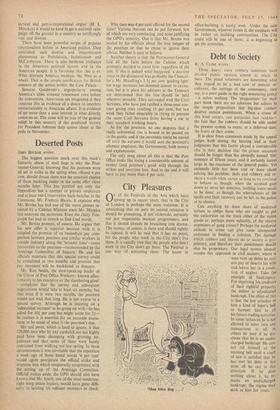Deserted Posts
JOHN BOURNE writes:
The biggest question mark over this week's fantastic chaos of mail bags is why the Post- master-General, knowing that his postmen were all set to strike in the spring when offered 4,per cent, should dream there was the remotest chance of them buckling under to the same offer three months later. This has puzzled not only the Opposition but a number of private employers and at least one Conservative back-bencher in the Commons, Mr. Frederic Harris. It explains why Mr. Bevins has had one of the worst presses re- ceived by a Cabinet Minister since Mr. Marples last annoyed the motorists. Even the Daily Tele- graph has had to stretch to find kind words.
Mr. Bevins protests, of course. He argues that his new offer is superior because with it is coupled the promise of an immediate pay com- parison between postmen and similar workers in outside industry along the 'broader lines'—more favourable to the postmen—recommended by the Armitage Committee of Inquiry. He and his officials maintain that this special survey could be completed in two months and promise that pay increases will be backdated to January.
Mr. Ron Smith, the slow-speaking leader of the Union of Post Office Workers—known affec- tionately to his executive as 'the slumbering giant' —complains that the survey and subsequent negotiations would take at least six months; but that even if it were two months the postmen would not wait that long. He is not averse to a special survey. Although he is insisting on a 'substantial increase' to be going on with—he has asked for 10+ per cent but might settle for 7{— he realises it is essential for an accurate assess- ment to be made of what is the postmen's due.
His real point, which is hard to ignore, is that 120,000 men who by any yardstick are not highly paid have been champing with growing im- patience and that some of them were barely restrained from walking 0th last spring. In these circumstances it was inevitable that the repetition a week ago of those hated words '4 per cent' would again precipitate the official strike and overtime ban which temporarily evaporated with the setting up of the Armitage Committee. Official strikes aside, the GPO should also have known that Mr. Smith, one of the most moderate, right wing union leaders, would have great diffi- culty in holding his militant members in check. Why then was 4 per cent offered for the second time? Various theories can be put forward, few of which are very convincing, and none justifying the GPO's temerity. One is that Mr. Bevins was misled by his officials about the true temper of the postmen or that he chose to ignore their advice. Neither is easy to believe.
Another theory is that the Postmaster-General laid all the facts before the Cabinet which promptly decided to stand firm, regardless of the cost. If this is indeed what happened, a decisive voice in the discussion was probably the Chancel- lor's. Mr. Maudling's 3-31 per cent 'guiding light' for wage increases has dimmed almost to extinc- tion, but it is plain his advisors at the Treasury are determined that the line should be held wherever possible. They succeeded with the Civil Servants, who have just ratified a three-year con- tract giving rises totalling 11 per cent, but last week they failed miserably in trying to prevent the same Civil Servants from having a cut in their standard working hours.
As for the postmen, no one disputes that a really substantial rise is bound to be passed on to the public and if the inevitable could be staved off until the autumn it would save the postmen's ultimate employer, the Government, both money and explanations.
The only snag about all this is that the Post Office looks like losing a considerable amount of money (and postmen's good will) through the strikes and overtime ban. And in the end it will
have to pay more than 4 per cent. '
























 Previous page
Previous page